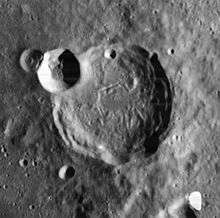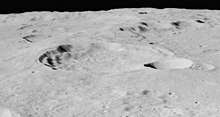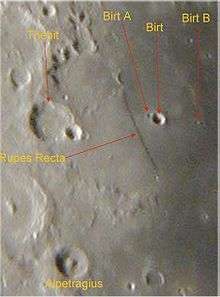Thebit (crater)
Thebit is a lunar impact crater located on the southeast shore of Mare Nubium. To the north-northwest is the crater Arzachel, and Purbach lies to the south-southwest. To the southwest is the flooded remnants of Thebit P, which is actually larger in diameter than Thebit itself.
 Lunar Orbiter 4 image | |
| Coordinates | 22.0°S 4.0°W |
|---|---|
| Diameter | 57 km |
| Depth | 3.3 km |
| Colongitude | 5° at sunrise |
| Eponym | Thābit ibn Qurra |


The rim of Thebit is generally circular in outline, with a double-notch in the southwest wall. A prominent bowl-shaped crater, Thebit A, lies across the west-northwestern rim. The west-northwestern rim of this crater is overlain in turn by the even smaller Thebit L. Together this forms an elegant arrangement that makes Thebit relatively simple to identify. The floor of Thebit crater is rough and has no central peak. The rim displays a terrace, and has a hilly outer rampart.
Due west of Thebit is a 110-kilometer-long ridge named Rupes Recta, which rises to 240 meters. This linear feature runs north-northwest to south-southeast across the Mare Nubium.
Name
Thebit is a Latinization of the name of the 9th century Syrian astronomer and mathematician Thābit ibn Qurra.[1]
Satellite craters
By convention these features are identified on lunar maps by placing the letter on the side of the crater midpoint that is closest to Thebit.
| Thebit | Latitude | Longitude | Diameter |
|---|---|---|---|
| A | 21.5° S | 4.9° W | 20 km |
| B | 22.3° S | 6.2° W | 4 km |
| C | 21.2° S | 4.1° W | 6 km |
| D | 19.8° S | 8.3° W | 5 km |
| E | 23.1° S | 4.6° W | 7 km |
| F | 23.0° S | 5.3° W | 4 km |
| J | 22.5° S | 5.5° W | 10 km |
| K | 23.1° S | 3.7° W | 5 km |
| L | 21.5° S | 5.4° W | 12 km |
| P | 24.0° S | 5.7° W | 78 km |
| Q | 20.1° S | 4.2° W | 16 km |
| R | 20.2° S | 4.8° W | 9 km |
| S | 24.8° S | 7.2° W | 16 km |
| T | 20.7° S | 6.0° W | 3 km |
| U | 20.3° S | 5.8° W | 4 km |
References
- "Thebit (crater)". Gazetteer of Planetary Nomenclature. USGS Astrogeology Research Program.
- Andersson, L. E.; Whitaker, E. A. (1982). NASA Catalogue of Lunar Nomenclature. NASA RP-1097.CS1 maint: ref=harv (link)
- Bussey, B.; Spudis, P. (2004). The Clementine Atlas of the Moon. New York: Cambridge University Press. ISBN 978-0-521-81528-4.CS1 maint: ref=harv (link)
- Cocks, Elijah E.; Cocks, Josiah C. (1995). Who's Who on the Moon: A Biographical Dictionary of Lunar Nomenclature. Tudor Publishers. ISBN 978-0-936389-27-1.CS1 maint: ref=harv (link)
- McDowell, Jonathan (July 15, 2007). "Lunar Nomenclature". Jonathan's Space Report. Retrieved 2007-10-24.CS1 maint: ref=harv (link)
- Menzel, D. H.; Minnaert, M.; Levin, B.; Dollfus, A.; Bell, B. (1971). "Report on Lunar Nomenclature by the Working Group of Commission 17 of the IAU". Space Science Reviews. 12 (2): 136–186. Bibcode:1971SSRv...12..136M. doi:10.1007/BF00171763.CS1 maint: ref=harv (link)
- Moore, Patrick (2001). On the Moon. Sterling Publishing Co. ISBN 978-0-304-35469-6.CS1 maint: ref=harv (link)
- Price, Fred W. (1988). The Moon Observer's Handbook. Cambridge University Press. ISBN 978-0-521-33500-3.CS1 maint: ref=harv (link)
- Rükl, Antonín (1990). Atlas of the Moon. Kalmbach Books. ISBN 978-0-913135-17-4.CS1 maint: ref=harv (link)
- Webb, Rev. T. W. (1962). Celestial Objects for Common Telescopes (6th revised ed.). Dover. ISBN 978-0-486-20917-3.CS1 maint: ref=harv (link)
- Whitaker, Ewen A. (1999). Mapping and Naming the Moon. Cambridge University Press. ISBN 978-0-521-62248-6.CS1 maint: ref=harv (link)
- Wlasuk, Peter T. (2000). Observing the Moon. Springer. ISBN 978-1-85233-193-1.CS1 maint: ref=harv (link)
External links
| Wikimedia Commons has media related to Thebit (crater). |
- Thebit at The Moon Wiki
- Wood, Chuck (2006-08-08). "Odd Interiors". Lunar Photo of the Day. Retrieved 2017-01-25.
- Wood, Chuck (August 20, 2009). "Succession". Lunar Photo of the Day.